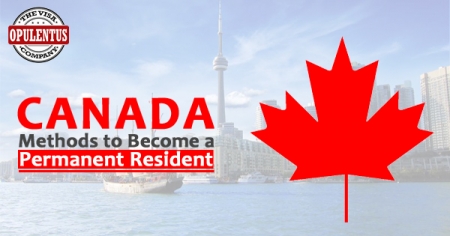World's No.1 Visa Specialist
Australia Partner Company
Australia Partner Company
23 Jun 2018

Generally, the pathway to become a Canadian permanent resident can be short for many people. It is possible to achieve it in two ways. It is either directly from overseas or by staying inside Canada, when the candidate, applies for various Canadian Immigration Programs. Many people who achieve the PR status first arrive in Canada as temporary residents on a Study/Work Permit.
Moreover, the experience in Canada received as temporary residents is calculated in the permanent residence application.
The immigration programs for becoming permanent residents directly have these main categories:
Based on the individual features and qualifications, the initial step, is to decide regarding the category where they can succeed. There are many immigration programs in each class, which aim to bring candidates who can integrate in the local environment in a quick manner.
Qualifying for Economic Class Immigration
Over the next three years, Canada has come out with a plan to welcome many Economic Class immigrants. The target is 177,500 for 2018, and will be 195,800 by 2020. Candidates must consider the Economic Class for immigration. Federal economic immigration operates on the Express Entry system.
Express Entry
Canada Express Entry system manages all categories of economic immigration programs in the country.
The federal economic immigration programs are:
Express Entry also selects candidates for some provincial immigration programs.
The Process of Express Entry
Candidates can enter the Express Entry pool after they submit a self-assessed profile
Each profile in the pool gets a ranking based on the Comprehensive Ranking System
The profiles which have the best score receive the invitation to apply in the Express Entry draws, which happen regularly, usually once in two weeks.
Such Candidates need to submit their full application within 90-days.
The processing time generally is six months for 80% of candidates, after they receive an invitation.
Scenario when a candidate does Not Qualify for Express Entry
Candidates who do Not Qualify for Express Entry can opt for the provincial immigration program. Moreover, there are programs where the provinces attract professionals to meet the specific shortages in labor market. These are technology workers in certain provinces, long-haul truck drivers, as well as medical doctors also. The provincial programs need a job offer in order to qualify. Some provinces have certain lists of occupations which have a good demand. The programs for such occupations open and close, generally in less than a day. Candidates, who do not qualify for a provincial program, can also use the work permit route. They can arrive in Canada temporarily through the Temporary Foreign Worker Program or Study Permit stream. Afterwards they can make a transition to get permanent residence.
Qualifying for the Family Class
Family reunification is of great support to the Canadian immigration system.
The federal government has a plan to welcome 86,000 immigrants in family sponsorship in 2018, which will gradually increase to 91,000 by 2020.
Beneficiaries
Beneficiaries who can be sponsored in the Family Class are Spouse, Common law partner, Dependent children, Parents, and Grandparents. Besides them, Brothers, sisters, nephews or nieces, grandchildren who are orphans, and minors, below18 years of age, and not married, or in a common-law relationship, also qualify.
Each sponsorship category has several specific requirements and come with a waiting period. Moreover, Candidates who do not meet the requirements need to enter the Economic Class.
Qualifying for Business Class Immigration
Entrepreneurs and candidates with High net worth should consider using the Business Class route, for permanent residence in federal/provincial immigration programs. Moreover, many provincial programs need a process involving two-steps. It starts with a work permit. Candidates satisfying the conditions get an invitation to apply seeking permanent residence.
Federal business programs are Start-Up Visa, Self-Employed Class, and Immigrant Investor Venture Capital Pilot Program. Quebec Province operates its own Business Class category which includes:
Other provinces of Canada also operate business programs which involve the candidates who enter Canada on work permits and achieve permanent residence after meeting the conditions. Such programs are managed by British Columbia, Manitoba, Saskatchewan, Ontario and New Brunswick. Additionally, Prince Edward Island, offers direct permanent residence, using its business program. Finally, Candidates need to pay a deposit, which is paid back, after they fulfill certain conditions.
To get more details related to Canada fill out a Free Evaluation Form or contact us at [email protected] or call us 7207111222. One of our experts will meet your expectations and provide answers to queries.
Posted On 13 Jun 2020
Posted On 12 Jun 2020
Hi! How can we help you?
Click below button to start chat
